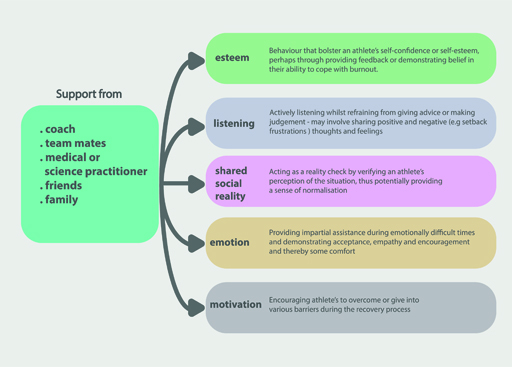7 Categories of social support
Social support is considered a multidimensional construct with subtly different categories of support possible. In the next activity you will work to identify the different categories of social support within your own social, domestic or sporting circles.
Activity 6 Identifying your own social support networks
Examine Figure 8 below in which five main types of social support are summarised. Think about your own experiences of providing or receiving social support. To what extent do these categories of social support exist amongst your own social, domestic or sporting circles?
Discussion
Perhaps the two most familiar categories of social support are the first two: those related to esteem and listening. However, this figure shows how social support might provide further different categories of support that verify perceptions (shared social reality), provide emotional acceptance and encouragement as well as motivational encouragement through difficult times.
DeFreese et al. (2015) make practical suggestions about strategies to bolster the social support networks amongst athlete groups:
- provide pre- and during-season opportunities in groups that support positive social interactions
- consider team building activities within the practice structure, and
- encourage social activities of teams beyond sport training time.
The powerful effect of social support and helping athletes feel they are supported is not fully appreciated. There is arguably a need to educate coaches and athletes of the value of support networks and the positive effects these can have in preventing and reducing burnout.
However, your own behaviour towards others can also have a marked impact on other people’s willingness to ask for support, as the next section illustrates.

